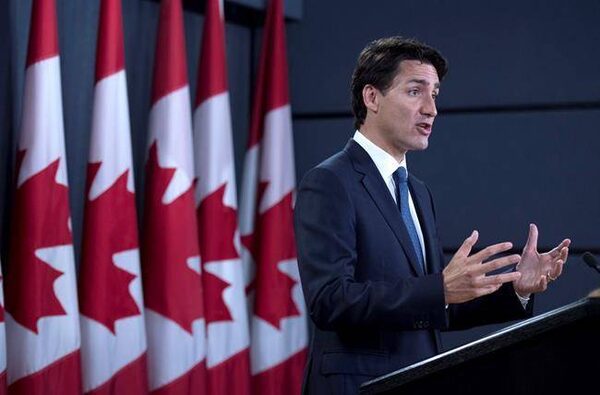
Prime Minister Justin Trudeau speaks during a media availability at the National Press Theatre in Ottawa on Tuesday, June 27, 2017. THE CANADIAN PRESS/Justin TangThe Canadian Press
An overwhelming majority of Canadians oppose the sale of two domestic technology companies with military customers to Chinese investors and believe these takeovers should be a top priority for national-security reviews, according to a new public opinion survey.
Despite these concerns, a poll by Nanos Research found a slight majority of Canadians favour the Liberal government's pursuit of a bilateral free-trade agreement with Beijing. More than half of Canadians say the level of "friendliness between China and Canada is right."
But the Nanos poll, commissioned by The Globe and Mail, shows that more than three-quarters of Canadians oppose Ottawa's recent decisions to allow Chinese investors to buy two Canadian high tech firms that have developed military-edge technology.
"For many Canadians, they actually believe those transactions put Canada at risk," pollster Nik Nanos said in an interview. "If the government continues to embark on this path, it will probably be a significant political risk for them."
In June, the Liberal government approved the takeover of Norsat International by a controversial Chinese telecom giant without conducting a comprehensive national-security review, even though the Vancouver company sells its satellite technology to the U.S. military, NATO and other foreign defence forces.
The Pentagon announced last Monday it was reviewing all of its contracts with Norsat after members of the U.S. House of Representatives armed services committee and a congressional watchdog commission raised national-security concerns about the takeover by Hytera Communications, which U.S. rival Motorola has accused of a massive theft of its intellectual property.
In March, the federal cabinet also rescinded a decision by the former Conservative government that had blocked the sale of ITF Technologies to Hong Kong-based O-Net Communications, which is partially owned by the Chinese government. The Canadian Security Intelligence Service had opposed the takeover on grounds it would result in the transfer of advanced military laser technology to China.
The Nanos poll found 76 per cent of Canadians oppose or somewhat oppose the takeover of Norsat while 18 per cent support or somewhat support the purchase. Nearly four-fifths or 78 per cent of Canadians oppose or somewhat oppose China's purchase of Montreal-based ITF Technologies.
"Although people understand it is important to have good trade relations with China, they find it more difficult to understand why transactions that could directly impact our national security or have military purposes – how that connects," Mr. Nanos said.
Deepening trade relations with China, including a free-trade deal, is a key foreign-policy objective for Prime Minister Justin Trudeau, and has led Liberals to loosen restrictions on investment from China. In April, Chinese Premier Li Keqiang used a personal telephone call with Mr. Trudeau on Tuesday to press Canada to relax controls on exports of high technology to China. "The Chinese Premier hoped that Canada would relax the restrictions on high-tech exports to China, believing this would be helpful to a balanced growth of bilateral trade," Xinhua, China's state-controlled news agency, reported at the time.
The New York Times reported earlier this year that the U.S. Defence Department was concerned about the flow of Chinese investment into startups working on important technology such as artificial intelligence, robotics and augmented reality.
Critics say the Liberals are attempting to appease China by foregoing national-security reviews which China has denounced as protectionism. Ottawa is in the midst of exploratory free-trade talks.
The poll of 1,000 Canadians – conducted June 24-27 – also found 39 per cent believe the top priority for national-security reviews should be purchases of Canadian companies by firms in China. The survey also found 26 per cent of Canadians felt the top priority for such reviews should be corporate takeovers by Russian firms. Only 9 per cent believed U.S. purchases should be the top priority and 1 per cent felt Japanese acquisitions should receive the greatest attention.
However, 54 per cent of Canadians support or somewhat support the Liberal government's pursuit of a free-trade deal with China compared with 37 per cent who oppose or somewhat oppose a trade deal.
This level of support is an increase from 18 months ago, shortly after Mr. Trudeau took power, when a Nanos poll showed 41-per-cent support or somewhat support a free-trade deal with China and 47 per cent opposed or somewhat opposed such an accord. Mr. Nanos said Canadians should not underestimate how Mr. Trudeau's friendly approach to China, a contrast from former prime minister Stephen Harper, affects public perceptions of the merit of such an agreement.
"It is pretty clear that Justin Trudeau is comfortable about free trade with China and having good relations with China and that consistent kind of message and kind of campaign over a long period of time pays off about peoples' perceptions of free trade with China," he said. "The cautionary note has to do with national-security concerns … it is pretty clear that Canadians see China and to a lesser extent Russia as top threats to our security."
In April, Mr. Nanos conducted a poll for The Globe that found nearly nine in 10 Canadians are "uncomfortable" with the idea of China's large, government-controlled businesses gaining more access to Canada's economy – an almost inevitable aspect of any free-trade deal with Beijing.
 Robert Fife
Robert Fife Steven Chase
Steven Chase